Like a garden choked by too many plants competing for nutrients, today's children often struggle to thrive in an environment overcrowded with activities, toys, and constant stimulation. You'll notice that despite parents' best intentions to provide every opportunity, many kids are showing increasing signs of anxiety, attention issues, and emotional overwhelm. It's no coincidence that as schedules become more packed and playrooms more cluttered, children's natural ability to focus and self-regulate diminishes. Yet there's a counterintuitive solution that's gaining traction among families worldwide: the power of less. Let's explore how scaling back can actually help your child move forward.
Key Takeaways
- Reducing physical clutter and rotating toys improves children's focus, behavior, and ability to engage in meaningful imaginative play.
- Establishing consistent routines and boundaries creates emotional security, reduces anxiety, and helps children develop self-regulation skills.
- Minimizing overscheduling allows children necessary downtime for processing experiences, reducing stress and supporting healthy emotional development.
- Simple, clear rules with positive framing help children understand expectations while building trust and security in their environment.
- Fewer structured activities and more unstructured playtime supports natural development, creativity, and individual growth patterns.
The Cost of Overscheduling
While many parents believe that filling their children's schedules with enriching activities will give them an advantage in life, research increasingly shows that overscheduling can lead to stress, anxiety, and burnout in young people.
When you're constantly rushing from one activity to another, proper time management becomes nearly impossible, and your child's emotional well-being suffers.
You'll notice signs of childhood anxiety emerging when there's no downtime between activities. Your children need unstructured moments to process their experiences, develop creativity, and simply breathe.
Setting clear family priorities helps you determine which activities truly matter versus those that merely fill time.
Creating an activity balance isn't just about reducing commitments—it's about making space for quality time together.
When you practice mindful parenting by carefully selecting activities that align with your child's interests and energy levels, you're investing in their long-term development.
Consider that stress reduction often comes from doing less, not more. By simplifying your child's schedule, you're teaching them valuable lessons about balance, self-care, and the importance of unstructured play in their daily lives.
Decluttering Your Child's World
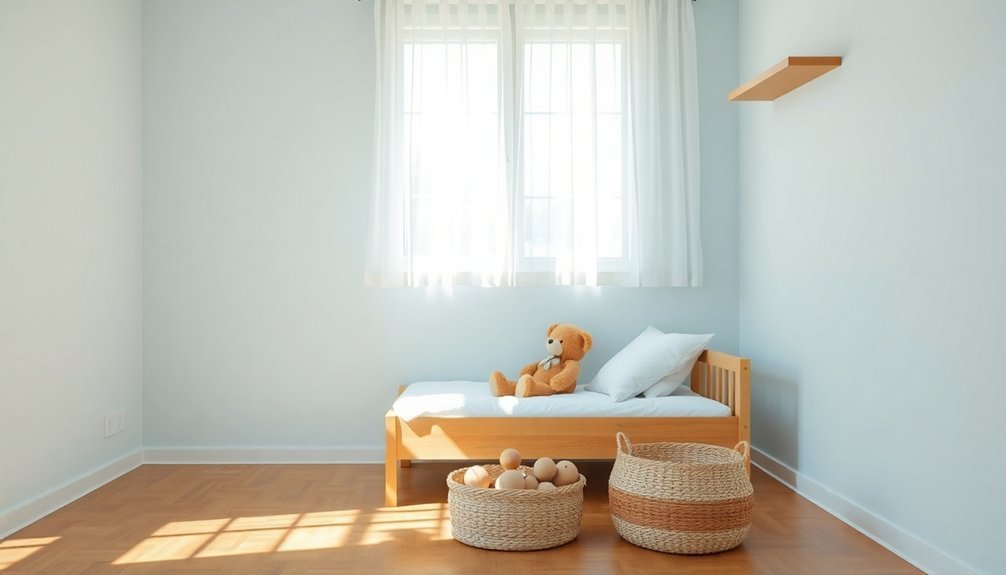
Just as overscheduling can overwhelm a child's mental space, physical clutter can create similar feelings of stress and overwhelm in their environment. Research shows that a focused environment promotes better concentration, creativity, and emotional well-being in children. By implementing mindful storage and space optimization strategies, you'll help your child thrive in a more organized setting.
Start your decluttering journey with a systematic toys evaluation, considering both emotional attachments and clutter consequences:
| Area | Action Steps | Benefits |
|---|---|---|
| Play Space | Remove broken toys, organize by category | Promotes organized play, reduces overwhelm |
| Storage | Use clear containers, implement rotation system | Enhances child autonomy, creates appreciation |
| Bedroom | Create designated spaces, minimize decorations | Improves sleep quality, reduces distractions |
| Common Areas | Set boundaries for toy spread, maintain order | Builds family harmony, teaches responsibility |
Remember that adopting a minimalism mindset doesn't mean eliminating joy – it's about maximizing simplicity benefits. You'll notice your child engaging more deeply with fewer, carefully chosen items, developing stronger focus and imagination. Support them in making decisions about their belongings to foster independence and decision-making skills.
Creating Meaningful Family Rhythms
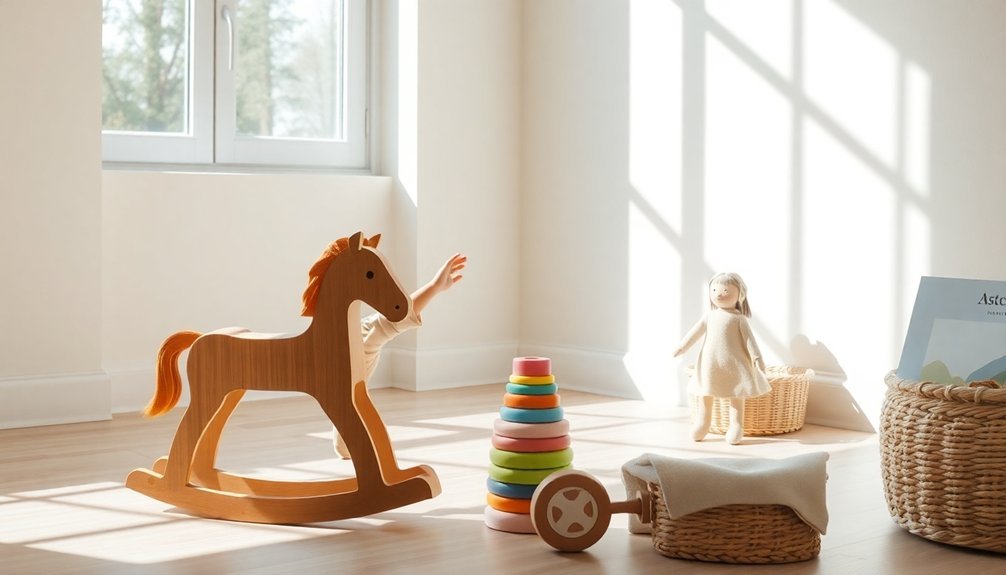
As modern families navigate increasingly complex schedules, establishing consistent daily rhythms becomes essential for children's emotional security and development. When you create predictable patterns in your home, you're building a foundation of stability that helps your children feel safe and grounded in an often chaotic world.
Start by identifying key moments in your day that can become meaningful daily rituals. Morning routines might include a special wake-up song, a shared breakfast, or a moment of gratitude. Bedtime sequences can feature storytelling, gentle back rubs, or quiet reflection about the day's events. These small but significant touchpoints create anchors your children can rely on.
Family traditions extend beyond daily rhythms to weekly and seasonal celebrations. You might establish "Pizza Friday," monthly nature walks, or seasonal crafting sessions.
Research shows that children who experience consistent family routines demonstrate better emotional regulation, stronger social skills, and higher academic achievement. They're also more likely to carry these positive patterns into their own families later in life.
Less Stuff More Connection
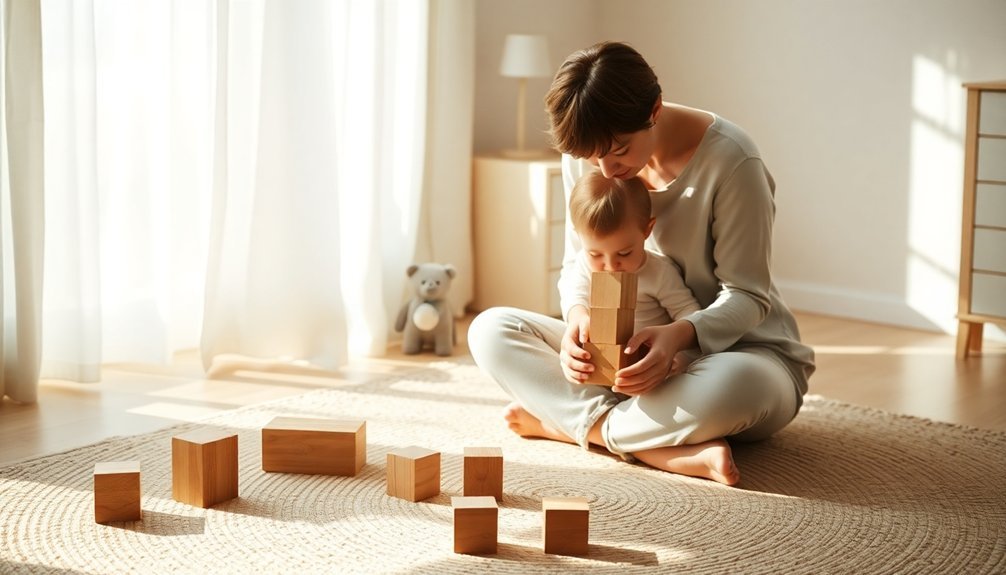
Modern families often get caught in the cycle of material abundance, where toys, gadgets, and possessions overflow from every corner of the home. This excess can overwhelm children, making it harder for them to focus, play creatively, and form meaningful connections.
By embracing a minimalist mindset, you'll create space for what truly matters: genuine interactions and emotional bonds with your children.
Intentional living means carefully considering what adds value to your family's life. When you reduce physical clutter, you'll notice improvements in your children's behavior and your family's overall well-being. Research shows that children with fewer toys engage in longer periods of play and develop stronger imaginative abilities.
Consider these practical steps toward meaningful connection through simplification:
- Rotate toys periodically, keeping only a few options available at a time
- Create dedicated spaces for family activities without electronic distractions
- Replace material gifts with experience-based presents that you can enjoy together
Remember that connection flourishes in the space you create by letting go of excess. Your children don't need the latest gadgets or endless toys – they need your presence, attention, and the freedom to explore their world without overwhelming stimulation.
Embracing Natural Development
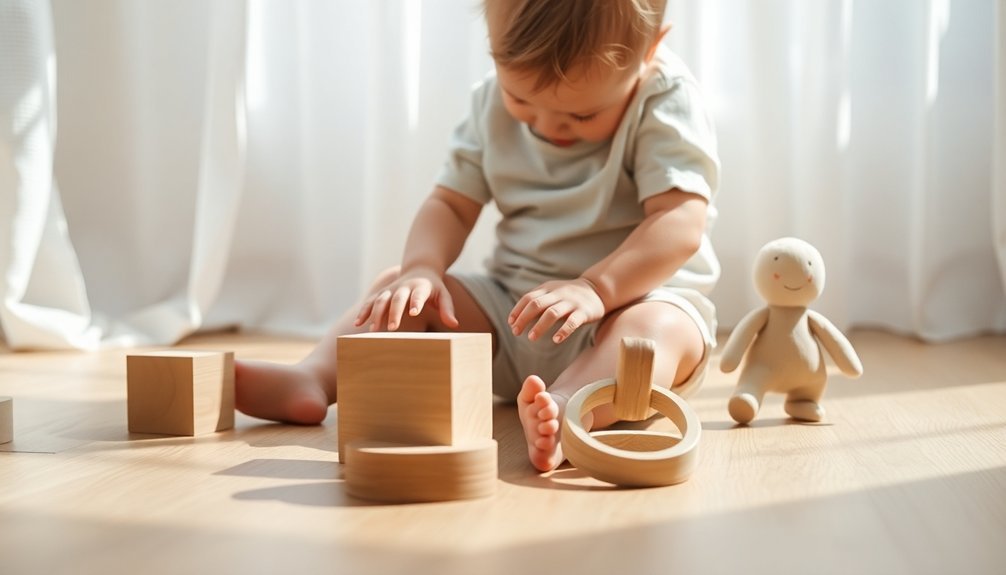
When parents step back and observe their children's natural growth patterns, they discover something remarkable: every child unfolds at their own unique pace.
By resisting the urge to accelerate your child's development, you'll allow their innate abilities to emerge naturally and confidently.
Natural play serves as your child's primary vehicle for learning and growth.
You'll notice how they instinctively seek out activities that align with their current developmental needs.
Whether it's stacking blocks at two or creating elaborate pretend scenarios at five, they're building essential skills at exactly the right time for them.
While developmental milestones provide helpful guidelines, they shouldn't become a source of anxiety or competition.
You'll find that your child may master certain skills earlier or later than their peers – and that's perfectly normal.
Instead of rushing to meet arbitrary timelines, focus on creating an environment that supports exploration and discovery.
Trust in your child's inherent wisdom to guide their development.
When you provide simple, open-ended materials and unstructured time, you're giving them exactly what they need to grow at their own perfect pace.
Setting Boundaries With Purpose
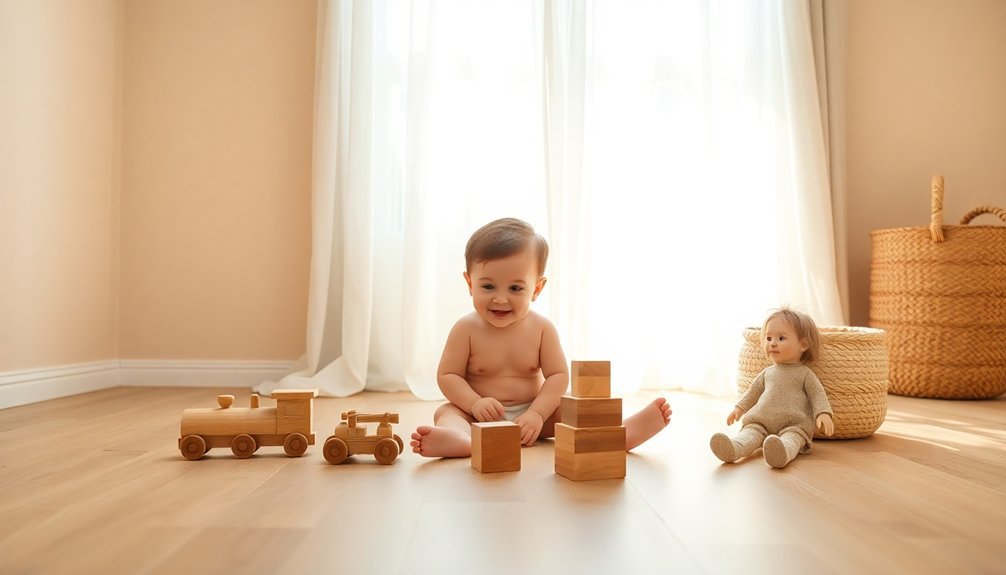
Setting clear boundaries for your children creates a sense of security that allows their minds to focus on learning and growing rather than testing limits.
When you establish purposeful rules and routines, you're actually providing your children with the structure they need to develop independence and self-regulation.
Your consistent boundaries aren't restrictions but rather expressions of love that help your children understand their world and their place within it.
Clear Rules, Clear Mind
Boundaries create the essential framework children need to feel secure and understand their world. When you establish consistent expectations through mindful communication, you're helping your child develop internal regulation and emotional intelligence.
Clear rules act as guideposts, reducing anxiety and creating a sense of predictability that allows children to thrive. Your family's rules should reflect your values while remaining developmentally appropriate.
Research shows that children who understand the 'why' behind rules are more likely to internalize and follow them. Consider these essential elements when establishing family guidelines:
- Keep rules simple and specific – instead of "be good," try "use gentle hands with siblings"
- Focus on the positive – frame rules as "we walk inside" rather than "no running"
- Be consistent in enforcement – apply consequences fairly and predictably
Remember that rules aren't about control – they're about creating a safe space where children can explore, learn, and grow with confidence.
When kids understand their boundaries, they're better equipped to develop self-discipline and make sound decisions. This clarity of expectations helps build the foundation for emotional security and healthy development.
Structure Creates Freedom
Providing structure may seem paradoxical, but it actually creates the space children need to flourish. When you establish consistent routines and clear boundaries, you're not restricting your child's freedom – you're creating a secure framework within which they can explore, create, and grow with confidence.
Research shows that children who experience freedom through structure develop stronger self-regulation skills and emotional security. You'll notice that when your children know what to expect from their daily rhythms, they're better equipped to handle changes and challenges. This balance in routines helps them feel grounded while building resilience.
Think of structure as the banks of a river – without them, water disperses aimlessly, but with them, the river flows purposefully and powerfully. Similarly, your child's energy and creativity find meaningful direction within the boundaries you set.
Boundaries Show Love
Through the lens of child development, boundaries emerge as one of the most profound expressions of parental love. When you set loving limits, you're creating a safe container where your child can grow, explore, and develop with confidence. Your boundary teachings aren't restrictions – they're guideposts that help your child navigate their expanding world.
Children thrive when they understand where the lines are drawn, even if they sometimes push against them. You'll notice that consistent, clear boundaries help your child:
- Develop internal self-regulation skills that serve them throughout life
- Feel secure and protected, knowing you care enough to set limits
- Learn important social skills and understand how to respect others' boundaries
Setting boundaries isn't about control; it's about connection. When you establish and maintain loving limits, you're showing your child that they matter enough for you to stay engaged, even when it's challenging.
Your consistent boundaries create predictability, which reduces anxiety and builds trust. Remember, every time you lovingly enforce a boundary, you're teaching your child that they're worth protecting and guiding.
Frequently Asked Questions
How Can I Help My Child Cope With Digital Minimalism?
Start by modeling mindful consumption yourself – your child learns from watching you.
Set clear boundaries around screen time and create tech-free zones in your home, especially bedrooms.
You'll find that a gentle digital detox becomes easier when you replace screens with engaging alternatives like outdoor play, crafts, or family games.
What Age Should I Start Implementing Simplicity Parenting Techniques?
Ever wonder if it's too early to start creating a calmer home life? You can begin implementing simple parenting techniques from birth, but the toddler shift period (ages 1-3) is an especially powerful time to establish rhythms.
As your child enters preschool routines, you'll find it easier to maintain consistent practices. Start small – declutter toys, create predictable mealtimes, and limit overstimulation.
How Do Grandparents' Gifts Fit Into Simplicity Parenting?
You can manage grandparents' gifts by setting loving gift boundaries early on.
Have open conversations about your family's values around mindful gifting, suggesting experiences or practical items instead of numerous toys.
You might create a wishlist, propose contribution to education funds, or encourage shared activities.
Can Simplicity Parenting Work for Children With Special Needs?
While some children need more and others thrive with less, you can adapt parenting strategies for your child with special needs.
You'll find that simplifying routines, environments, and schedules often helps reduce overwhelm and anxiety.
It's crucial to work with your child's therapists and healthcare providers to tailor the approach.
You're not alone – many parents have successfully modified these principles to meet their child's unique needs while maintaining the core benefits.
Does Simplicity Parenting Affect Social Skills Development in Only Children?
You'll find that only children can develop strong social skills through intentional, simplified interactions.
When you create opportunities for quality playdates and family connections, your child learns valuable social cues and emotional intelligence.
Don't worry – less structured activities often lead to more meaningful peer relationships.
You can support your child by focusing on deep, authentic social experiences rather than overwhelming them with constant activities and playmates.
Conclusion
You've been caught in the whirlwind of modern parenting – signing up for every enrichment class, buying the latest educational toys, and scheduling your child's life down to the minute. Stop. Take a breath. You'll find that scaling back creates space for genuine growth and connection. By embracing simplicity, you're not depriving your child; you're actually giving them the greatest gift: the freedom to develop naturally, confidently, and joyfully.








0 responses to “Simplicity Parenting: Why Less Really Is More”
Interesting read! However, isnt overscheduling often a result of societal pressure rather than parental choice? Thoughts?
Isnt decluttering our kids world just another way of controlling them? Let them navigate and learn, dont you think?